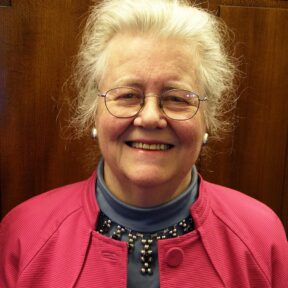
Peggy McIntosh
: Photo from Wikimedia Commons / Author of Photo: Peggy McIntoshOverview
* Scholar, feminist, and activist focusing on matters of race and gender
* Views America as a systematically racist and sexist country
* Has worked at the Wellesley College Centers for Women since 1979
* Founded the National SEED Project on Inclusive Curriculum in 1987
* Wrote “White Privilege and Male Privilege” in 1988
Peggy McIntosh was born on November 7, 1934 in Brooklyn, New York and grew up in New Jersey, where she attended a Quaker boarding school. She studied English at Radcliffe College and at University College in London. After completing her undergraduate coursework, McIntosh became a teacher at the Brearly School, a private, all-girls facility in New York City. She subsequently went on to obtain a PhD from Harvard University.
McIntosh today is best known as a scholar, feminist, and activist focusing on matters of race and gender. Since 1979 she has worked in Massachusetts at the Wellesley College Centers for Women (WCCW), where she currently serves as the Senior Research Scientist and Associate Director. In 1987 McIntosh founded the National SEED Project on Inclusive Curriculum (SEED is an acronym for Seeking Educational Equity and Diversity), which is located within WCCW and aims to make school curricula more “gender fair, multiculturally equitable, socioeconomically aware, and globally informed.” Since 1987, more than 2,600 K-16 teachers in 42 U.S. states and 15 countries worldwide have participated in the SEED Project. McIntosh stepped down as the Project’s co-director in 2011.
McIntosh first came into prominence with the publication of her 1988 working paper, “White Privilege and Male Privilege,” which is now regarded as a classic by so-called “anti-racist educators” who have used it in innumerable workshops and classes across North America. Asserting that whites and males alike “are carefully taught not to recognize” the many manifestations of the “privilege” from which they benefit simply as a result of their skin color and their sex, McIntosh likened “white privilege” in particular to “an invisible weightless knapsack” of “unearned assets” and “special provisions” that give whites, “through no virtues of their own,” a distinct advantage over their black counterparts. She listed 46 separate racial advantages from which white people routinely benefit.
“After I realized the extent to which men … work from a base of unacknowledged privilege,” McIntosh wrote in the same essay, “I understood that much of their oppressiveness was unconscious. Then I remembered the frequent charges from women of color that white women whom they encounter are oppressive. I began to understand why we are justly seen as oppressive, even when we don’t see ourselves that way. I began to count the ways in which I enjoy unearned skin privilege and have been conditioned into oblivion about its existence.” Examining further the intersection of “white privilege” and “male privilege,” McIntosh wrote:
“I have often noticed men’s unwillingness to grant that they are over privileged in the curriculum, even though they may grant that women are disadvantaged. Denials that amount to taboos surround the subject of advantages that men gain from women’s disadvantages. These denials protect male privilege from being fully recognized, acknowledged, lessened, or ended. Thinking through unacknowledged male privilege as a phenomenon with a life of its own, I realized that since hierarchies in our society are interlocking, there was most likely a phenomenon of white privilege that was similarly denied and protected, but alive and real in its effects. As a white person, I realized I had been taught about racism as something that puts others at a disadvantage, but had been taught not to see one of its corollary aspects, white privilege, which puts me at an advantage.”
In 1989 McIntosh released a condensed version of “White Privilege and Male Privilege,” titled “White Privilege: Unpacking the Invisible Knapsack,” which first appeared in the July/August edition of Peace and Freedom Magazine, a publication of the Women’s International League for Peace and Freedom.
In 1993-94, McIntosh consulted with women on more than 20 college campuses in Asia to develop Women’s Studies programs at those schools.
In 2006, McIntosh was featured in Mirrors of Privilege: Making Whiteness Visible, a documentary film that showed white activists discussing how they had once been “unconscious about their learned and internalized sense of white supremacy.” The documentary was produced by World Trust, an organization whose mission is to use “film and dialogue” to help “create a world free from racism.”
Over the course of her professional career, McIntosh has taught English, American Studies, and Women’s Studies at the Brearley School, Harvard University, Trinity College (Washington, DC), Durham University (England), Wellesley College, and the University of Denver. At Denver, McIntosh instituted what she termed “radical teaching methods” in her three specialty disciplines. She also co-founded the Rocky Mountain Women’s Institute, which closed in 2009.
For additional information on Peggy McIntosh, click here.
Further Reading: “White Privilege and Male Privilege” (by Peggy McIntosh, 1988); “White Privilege: Unpacking the Invisible Knapsack” (by Peggy McIntosh, 1989); “The Origins of ‘Privilege‘” (by Joshua Rothman, New Yorker, 5-12-2014); History of the National Seed Project.